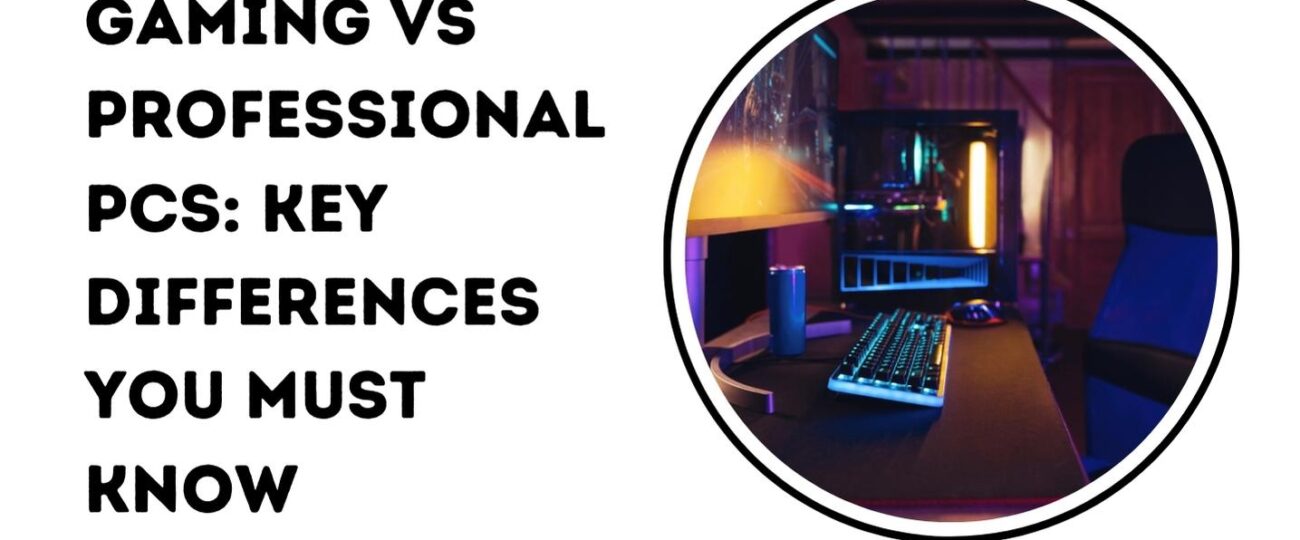Building a PC can be an exciting as well as rewarding experience, but people often tend to get confused between the requirements of Gaming PC and Professional PC. TechMatched has an extensive range of customized Professional PC Builds to help out professionals seeking off the shelf PC builds. Let’s see why Gaming and Professional PCs are different and why these differences matter.

Performance Priorities
Gaming PCs: Gaming PCs are designed primarily with high performance in mind. The main goal is to achieve high frame rates and smooth gameplay. To do this, the focus is on powerful graphics cards (GPUs) and high-speed processors (CPUs). A robust GPU, such as Nvidia’s RTX or AMD’s RX series, is essential for rendering detailed game graphics at high resolutions and frame rates. The CPU also plays a role, but in gaming, the GPU often takes precedence.
Professional PCs: Professional PCs, on the other hand, are tailored to handle demanding workloads like video editing, 3D rendering, data analysis, and software development. These tasks require strong CPU performance and often benefit from multiple cores and threads. Workstations may also use professional-grade GPUs like Nvidia’s Quadro or AMD’s Radeon Pro, which are optimized for stability and performance in professional applications rather than gaming.

Storage Needs
Gaming PCs: Gamers typically need fast storage solutions for quick load times. An SSD (Solid State Drive) is a must, with NVMe SSDs offering the fastest performance. While storage capacity is important, the speed of access is often prioritized to ensure games load quickly and perform smoothly.
Professional PCs: In a professional setting, both speed and capacity matter. Professionals working with large files, such as video editors or architects, need ample storage space. This often means a combination of SSDs for speed and larger HDDs (Hard Disk Drives) for capacity. Data redundancy and backups are also crucial, so RAID configurations may be used.

Memory Requirements
Gaming PCs: Most modern gaming PCs benefit from having at least 16GB of RAM. This amount ensures that games run smoothly and can handle multitasking, such as running streaming software alongside games. Some high-end gaming setups might opt for 32GB, but beyond that, the returns diminish for gaming purposes.
Professional PCs: Professionals may require much more memory, depending on their specific tasks. For example, video editing, 3D rendering, and large-scale data analysis can all benefit from 32GB of RAM or more. Some workstations might even go up to 64GB or beyond, ensuring they can handle large datasets and multiple applications running simultaneously.

Expandability and Upgradability
Gaming PCs: Gaming PCs are often built with future upgrades in mind. Gamers may want to swap out their GPU, add more RAM, or upgrade their storage as new games demand higher performance. Thus, a case with ample space and a motherboard with plenty of expansion slots are important.
Professional PCs: Professional PCs also need to be upgradable, but the focus might be more on adding specialized hardware, such as additional GPUs for rendering tasks, professional audio cards, or high-speed networking components. The design of a professional workstation often considers the specific needs of the user’s industry.
Cooling Solutions
Gaming PCs: High-performance gaming PCs generate a lot of heat, especially the GPU. As such, advanced cooling solutions, including liquid cooling, are often used to maintain optimal temperatures and ensure stable performance during long gaming sessions.
Professional PCs: Cooling is equally important in professional PCs, particularly for tasks that push the CPU and GPU to their limits. However, the cooling solutions might focus more on maintaining a quiet working environment, using larger, quieter fans and sound-dampening cases.

Cost Considerations
Gaming PCs: While gaming PCs can range from budget builds to high-end setups, gamers often prioritize getting the best performance for their money. This means balancing the cost between the GPU, CPU, and other components to get the most bang for their buck.
Professional PCs: Professional workstations are typically more expensive due to the need for specialized hardware and higher performance components. The investment is justified by the productivity gains and the ability to handle professional-grade workloads efficiently.
Conclusion
In summary, while gaming PCs and professional PCs have some common components, their performance requirements are quite distinct. Building your own PC can be a hassle too, and buying Gaming PC in Pakistan is simpler because of Techmatched.pk offering great customer services. Gaming PCs prioritize GPU performance and fast storage for smooth gameplay, while professional PCs focus on CPU power, large memory capacity, and specialized hardware to support demanding professional applications. Understanding these differences can help you build or buy the right PC to meet your specific needs, whether you’re aiming to conquer the latest game or tackle a complex work project. At Techmatched.pk, we’re here to help you every step of the way, ensuring you get the best performance for your investment.
See Also: Counter-Strike 1.6 (2003) Game Icons Banners: The Ultimate Guide










